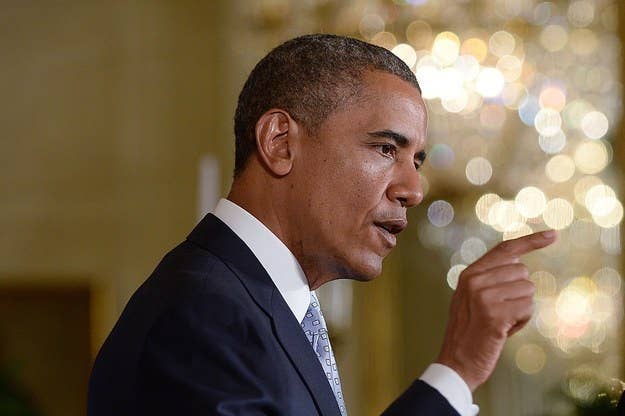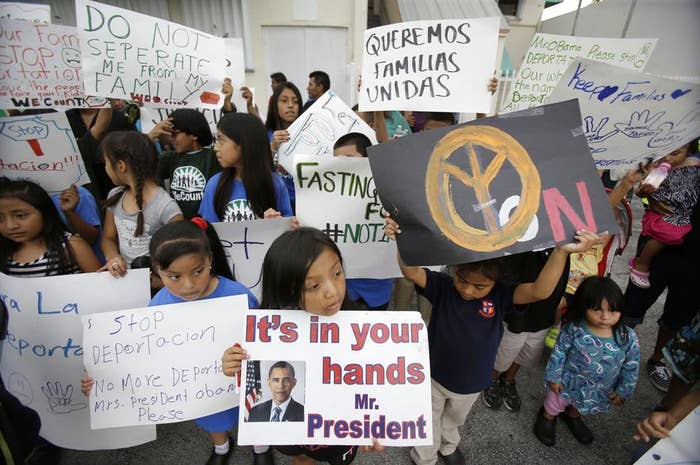
A clearly angry President Obama announced Monday that he plans to move forward with administrative action by the end of the summer on steps he can take without Congress, but within his existing authorities, to "fix as much of our broken immigration system as we can" because of Republican inaction on an immigration overhaul.
The announcement comes a week after Speaker John Boehner and Obama spoke before the PGA golf event where Boehner told him the House will not take a vote on immigration reform this year.
"Today I'm beginning a new effort to fix as much of the immigration system as I can on my own without Congress," he said, later adding that "it's very rare that you get labor, business, evangelicals, law enforcement all agreeing on what needs to be done."
The most important expected policy shift is "administrative relief," which activists have been calling for for all of 2014, a plan that would reset enforcement priorities and lessen record deportations. The president previously directed Department of Homeland Security (DHS) chief Jeh Johnson to look at its policies to make sure they are "humane."
The announcement comes the same day the administration released a letter about its plans to deal with the flood of unaccompanied minors from Central America.
The plan seeks to "surge resources to our Southwest border to deter both adults and children from this dangerous journey, increase capacity for enforcement and removal proceedings, and quickly return unlawful migrants to their home countries," the letter read in part.
Obama said he is directing officials to "move available and appropriate enforcement resources from our interior to the border," adding that the administration will continue to focus on removing those who have committed serious crimes from the country.
Boehner spokesman Michael Steel told BuzzFeed the speaker told Obama what he has been telling him all along.
"The American people and their elected officials don't trust him to enforce the law as written," he said. "Until that changes, it is going to be difficult to make progress on this issue."
Congressman Luis Gutierrez, who has often criticized the administration over deportations, praised the president's announcement.
"The antidote for do-nothingism is doing something and the President is doing for the American people what the Republican-controlled Congress refused to do," he said in a statement. "This is the President I voted for."

Obama met with immigration advocates before his announcement. Marielena Hincapié, executive director of the National Immigration Law Center, said it was the angriest she has ever seen him, his dual frustration over inaction on immigration along with the unaccompanied minors situation on display. She said he made it clear administrative relief is temporary and that activists need to continue to put pressure on Congress for a legislative solution.
"Interestingly, he said Boehner also talked about being able to do something [legislatively] after his election as speaker. That he would be ready in 2015 to move a bill on immigration reform," Hincapié said. Boehner spokesman Michael Steel says that was not true.
Now the debate turns to how big the president will go in passing administrative relief. Previously, new enforcement priorities were said to be on the table in a coming DHS memo. A bigger package centered around deferred action has long been floated by activists, in the same vein as the Deferred Action for Childhood Arrivals (DACA) program that gave legal status to undocumented youth who were brought to the country as children.
Gustavo Torres, executive director of CASA de Maryland, was at the meeting and said the president will look at the final recommendations and make his decision to see what he can do to stop deportations and provide other administrative relief for the community within his legal authority.
"The message we communicated was go big and bold and do it quickly," Torres said. "The time of waiting is over. He agreed with us and said he's going to do something before the elections."
Pablo Alvarado, executive director of the National Day Laborer Organizing Network, said the president's "enforcement-first strategy and his misguided deportation policy" were premised on the possibility of legislative reform, which is no longer available.
"What comes next will be a defining moment for the president and for the country," he said. "In de-linking his immigration policy from his legislative reform strategy, the president is now free to do the right thing, and he can fulfill the promise of being a transformative president."
On an earlier press call about the unaccompanied minors situation, Hincapié said she didn't want to see the children played off of the undocumented immigrants in the United States.
She said she hoped the administration wasn't coming out strong against the unaccompanied minors to allow itself the ability to move on executive actions to slow deportations afterward.
"If the administration is trying to create political space for administrative reforms, many of us will stand united so the administration does not pit children against the 11 million," she said at the time.
Now it looks like the White House has answered that question.
Kate Nocera contributed reporting.
